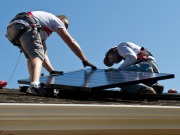
The latest statistics from the Department of Energy & Climate Change (DECC) have revealed over 23,000 Welsh homes have had solar panels installed, generating power for their own domestic use while feeding excess electricity back to the national grid. This means that solar power is now more popular in Wales than in the rest of Britain with 177 installations per 10,000 Welsh homes.
Some towns in Wales have been quicker to install than others with Wrexham as the number one Welsh solar PV hotspot. The town now has 509 installations per 10,000 households which is the second highest installation rate in the whole of the UK. Altogether the Wrexham area has around 3000 homes fitted with solar PV.
Monmouth follows close behind Wrexham with 327 per 10,000 households, then Torfaen with 301. Most other areas of South Wales have however been more reluctant with seven local authorities not even obtaining the UK national average.
The news has been welcomed by WWF Cymru following its call for a switch to renewable power during WWF’s Earth Hour 2013 campaign. Earth Hour itself will take place on Saturday 23rd March at 8.30pm.
“Calling for a switch from polluting fossil fuels to renewable energy is at the heart of WWF’s Earth Hour this year” said Alun James, WWF Cymru Policy Officer. “So it’s great to see the progress being made on solar energy in Wales. By installing panels and, of course, improving the energy efficiency of our homes, we are helping to reduce our dependence on coal, oil and gas which contribute to climate change.”
Mr James added that while it’s difficult to say exactly why certain areas are leading on solar panel installations, it is clear that Wrexham Council’s efforts to install panels on thousands of homes has put it at the top of the table.
“Domestic solar panels are one piece of the renewable energy jigsaw” he continued. “Adding other types of renewables such as wind and tidal energy builds a picture of a green energy system in Wales which delivers low carbon electricity and contributes to a better environment for future generations.”
Further information:

